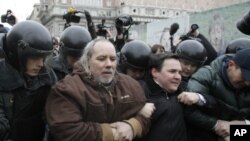One month ago, Russian Prime Minister Vladimir Putin easily won a six-year term as president, despite vigorous rallies by activists opposing his candidacy. Does his victory mean the end of Russia’s opposition movement? Not likely, it seems.
On Wednesday, barriers to registering a political party in Russia dropped sharply - from a requirement to collect 40,000 supporters' signatures to just 500. And with that came a wave of new parties hoping to garner votes.
Russia will now have its Party of Love and Party of Beer Lovers. Voters will be able to choose between the Party of Subtropical Russia and the Party of Social Networking Sites. And the Ten Commandments Party and a movement called Kind People of Russia also lined up to register.
Mark Feygin, long an activist for an unregistered political group, says he and his friends are going to form their own party.
He has not chosen a name yet, but says it will be a libertarian free-market party.
Coming as Moscow’s temperatures finally push above freezing, this political thaw reflects one of three promises for reform that President Dmitry Medvedev made in December to protesters demanding more democracy.
With one month left before Mr. Medvedev hands power over to President-elect Vladimir Putin, work continues on the two other reforms - a nationwide television station not under the Kremlin's control and switching to direct, popular elections to select Russia's regional leaders.
Direct elections for governors are expected to start later this year, and Russia’s president already has begun firing unpopular regional officeholders. The governor of Murmansk, in the Arctic region, was dismissed Wednesday.
By thinning the governors' ranks now, before a new election law takes effect, the Kremlin can appoint their successors. And the law may allow the new governors to serve full five-year terms.
In his latest move, Mr. Medvedev nominated Emergency Situations Minister Sergei Shoigu to be governor of the Moscow Region.
Shoigu is a native of Tuva, a predominantly Buddhist republic bordering Mongolia, 4,000 kilometers east of Moscow, and opinion polls consistently rate him the government’s most popular minister.
The Kremlin evidently believes his appointment to the Moscow Region will ease demands for immediate direct elections in Russia’s richest and most populous region.
Presidential candidate Putin failed to win a majority vote last month in the city of Moscow, and in the same elections independent candidates won 10 of 15 races for city mayors.
Some political experts say the new law on political parties will splinter Russia’s opposition into dozens of separate groups, competing against each other.
Feygin notes that parties are not allowed to form coalitions at election time. But Feygin, a former Duma member himself, also points out that once they gain parliament seats, opposition members are free to form informal coalitions and cast bloc votes.
Last Sunday, the anti-Kremlin trend continued: 70 percent of the voters in Yaroslavl, a mid-sized city north of Moscow, chose as mayor Yevgeny Urlashov, an independent who campaigned against the Kremlin.
Urlashov broke away from Mr. Putin's United Russia Party last year, and he defeated an acting mayor chosen by the ruling party. After his runaway victory, the new mayor said the people of Yaroslavl are tired of "corruption and nepotism." He promised them change, tighter financial controls and an end to bureaucratic red tape.
On the same day as the vote in Yaroslavl, authorities in Moscow took the rare step of closing access to Red Square, they wanted to prevent a rally by opposition activists.
Outside the barriers protecting the symbolic open square, police detained 55 people who were wearing white - the symbol of last winter’s opposition movement.
Analysts are predicting that Russia’s spring may not be as quiet as President-elect Putin had hoped.




